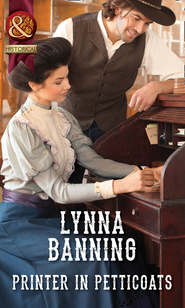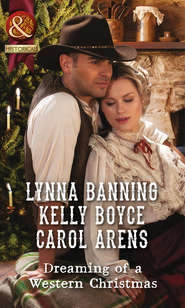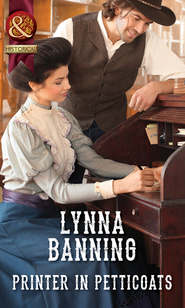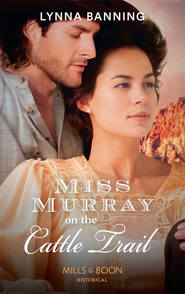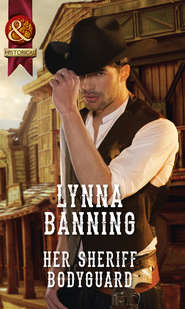По всем вопросам обращайтесь на: info@litportal.ru
(©) 2003-2025.
✖
Smoke River Bride
Настройки чтения
Размер шрифта
Высота строк
Поля
“Right. Well, let’s see if something else will work.” Thad hoisted one end of the cabinet up onto the first shallow porch step, then switched ends and lifted it again. Teddy leaned his back against the oak case to keep it from slipping.
Just as Thad reversed his position again, the cabin door banged open and a small jeanclad figure flew out. She looked so much like a boy Thad had to blink.
“Leah?”
“Yes,” she said calmly. Without another word she positioned herself opposite Thad.
He stared at her slim figure. She’d rolled the sleeves of the red plaid shirt up to her elbows, revealing slender forearms, and the jeans hugged her rounded bottom in a way that made his mouth go dry. Her waist was nipped in with a narrow length of woven scarlet cord of some kind, and the upper part of the shirt swelled gently over her breasts.
He wondered suddenly why more farm women didn’t dress that way. The garments were sturdy and practical. And on Leah—he swallowed—they were downright attractive.
He swallowed again as his brain churned out more images. What sort of undergarments did she have on? Did a Chinese woman wear a corset? A camisole? Bloomers? What?
He shook his head to clear his mind and focus on the task before him, drew in a deep breath and heaved the load up another step. Leah put her back against the opposite end and heaved, as well.
Teddy’s mouth dropped open and Thad had to laugh. She’d just shoved a heavy cabinet up a step and she wasn’t even breathing heavily. She must have worked hard in China all her life.
He gestured for his son to join Leah at her end. “Heave,” he muttered. This time six hands gripped the heavy sewing machine and swung it up onto the next step, where it teetered for a moment, then settled with a thunk.
“One more step,” Thad urged. When the cabinet finally rested on the porch, he surveyed his work crew with admiration. Teddy looked winded. Leah didn’t appear the least bit tired. Her cheeks were flushed, but her gray-green eyes sparkled with triumph.
“Here’s your sewing machine, Leah. Where do you want it?”
“Oh!” She dashed inside the small cabin interior, propping the door open with an empty apple crate, and stood studying the room. For the first time Thad noted that her feet were bare.
“Over there.” She pointed to the far corner, where a cat-clawed brocade armchair rested.
Thad retrieved the gunnysack, and he and Teddy used it to slide the cabinet across the stained plank floor. When it stood where Leah had indicated, she stepped back and gazed at it with an assessing eye while the two males caught their breath and massaged their shoulders.
“No,” she said at last. “All wrong. The light is not good.” She pivoted in a slow circle to inspect each cabin wall in turn. “There,” she said finally. “Under the window.” She pointed to the opposite side of the room.
Thad and Teddy groaned in unison, but bent to the opposite corners of the gunnysack. “You’re sure, now?” Thad asked drily.
Leah shot him a look. “Yes, quite sure.”
Again Thad and his son traded glances. This time Thad rolled his eyes toward the ceiling and Teddy suppressed a giggle.
Leah crossed to stand opposite the two cabinet movers, and when Thad and Teddy started to slide their load across the floor, she laid her backside against the opposite end, lowered her head and shoved. The sewing machine scooted smoothly across the floor.
Leah spun around. “Yes,” she breathed. “Perfect.”
Thad’s eyebrows went up. “You sure?”
Teddy clasped both arms over his chest and scowled at her.
Leah faced them both, her hands propped on her hips. “Of course I am sure! Did you think I would change my mind again?”
“Yep,” Thad and Teddy replied in unison.
Leah looked from her new husband to his young son. Their expressions were identical—narrowed eyes, unsmiling lips and a tiny frown between their identical red-brown eyebrows. Teddy resembled his father, right down to his stance, with both hands jammed in his back pockets.
“I do not change my mind,” she said quietly. “Once I decide what to do, I do not change.”
Frowning, Teddy studied the floor. She shifted her gaze to Thad. A variety of emotions showed in his face, a combination of surprise, bemusement and apprehension. His expression puzzled her until she remembered she wore boy’s clothing, her feet were bare and Teddy was not at all pleased that his father had married her.
She was in no position to insist on being accepted. Here in Smoke River she was safe and protected; she could endure a great deal of hardship and disapproval in the bargain. Still, a hard kernel of doubt niggled its way into her mind.
Thad and his son escaped to the barn, saying they had to care for the horse and do the milking. Tomorrow, Thad said, he would show Leah the chicken house and how to milk their temperamental cow.
As soon as the front door closed, she started to make the cabin habitable. Even the poorest hut in China had been better kept than this—neater and spotlessly clean. America was strange indeed.
She washed the sinkful of dirty dishes and pots in water she pumped and heated on the woodstove, then filled a tin bucket with more water, dumped in the last of her waning supply of powdered jasmine-scented soap and scrubbed the entire cabin floor on her hands and knees. When she rose at last, the floor squeaked under her bare toes.
Next she attacked the window over the sink and the one by the front door with a rag dipped in vinegar water, swept down the cobwebs drooping from the ceiling and dusted every surface she could find, from the oak headboard in the bedroom to the shelf of Teddy’s schoolbooks, even the shiny black Singer sewing machine in its oak cabinet.
Then she climbed the built-in ladder to the loft, where she made up Teddy’s disheveled bed and was straightening his jumbled collection of rocks when she spied a children’s book lodged between the bureau and the wall. East of the Sun, West of the Moon. She had read it herself as a child. Suddenly she was glad her father had made her study so hard at his mission school. Thad wanted an educated woman to care for and perhaps set an example for his son.
She dragged the woven rag rug that covered the loft floor outside, tossed it over the clothesline and beat it with the broom until the puffs of dust made her cough.
What next? She felt compelled to keep herself busy; if she allowed herself to stand still for a moment she would think about her marriage and the bed and the coming night and Thad MacAllister, who was now her husband.
What would it be like, lying close to him in the dark, feeling his hands on her skin? Such thoughts made her shiver.
She reswept the kitchen floor, rinsed out a camisole and a pair of white silk drawers in the sink and hung them on the clothesline next to the rug from Teddy’s loft. Now she must think about supper for the three of them.
Chapter Six
The tiny pantry off the kitchen held a barrel of flour, sacks of sugar, rice, dried beans and potatoes, and a hanging slab of moldy-looking bacon. No carrots or peas or turnips or herbs. No fresh fruit, either—only a lone tin of peaches and a bushel basket half full of apples. What could she make out of such a conglomeration?
Hours later, footsteps boomed across the front porch and Thad walked in with Teddy at his heels. At the stove, Leah froze with her back to them.
“Somethin’ sure smells funny, Pa.”
“Looks different, too, son. Kinda…shiny.”
Teddy clambered up the ladder to the loft and an instant later let out a squawk like an enraged rooster. “My bed’s all diff’rent! And my rocks—somebody’s been messing with my rocks!”
His head appeared over the railing. “She did it! I hate her!”
Thad ignored his son and gazed around the cabin. Clean windows. Scrubbed floor. No dishes in the sink. Looked as if a cyclone had blown through the place. He began to frown before Teddy finished yelling. He liked what Leah had done. But for some reason deep inside he didn’t want to like it. It seemed disloyal to Hattie.
But Hattie is gone. And Leah was here. He could hardly believe Leah was his wife now, and he had to admit his reaction to the state of his house had nothing to do with Hattie. He couldn’t bear to think about it too closely.
The cyclone was standing at the stove. Apparently she was a fastidious housekeeper, and of course his son wouldn’t appreciate that. Thad wondered why he didn’t appreciate it.
The spit and polish this half-Chinese girl had shown in just a few hours reminded him not so much of Hattie as his Scots mother. She was long dead now, as was his father. That was one reason Thad had come to America—the Scots were starving. He had just passed his twelfth birthday and both his parents were gone.
Hattie, he recalled, had not been a particularly careful housekeeper, but she had been his lifelong companion. And because he had loved her, he had forgiven her any domestic shortcomings.






